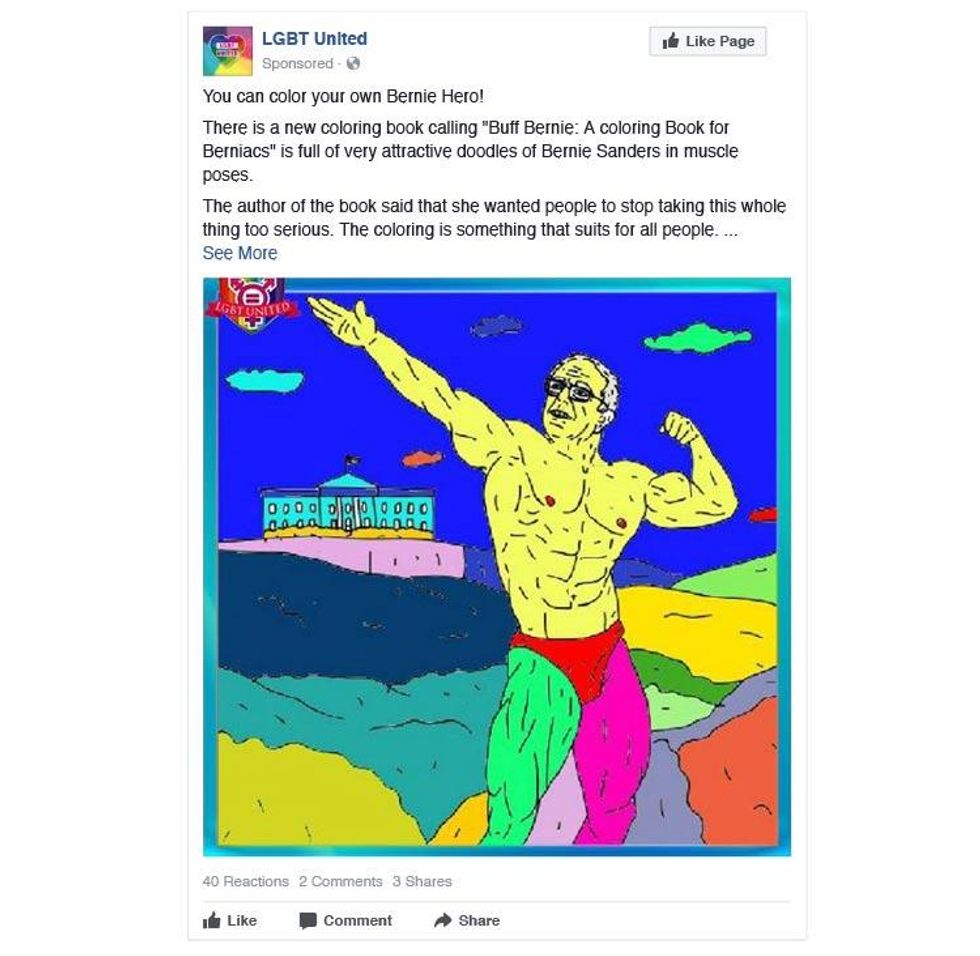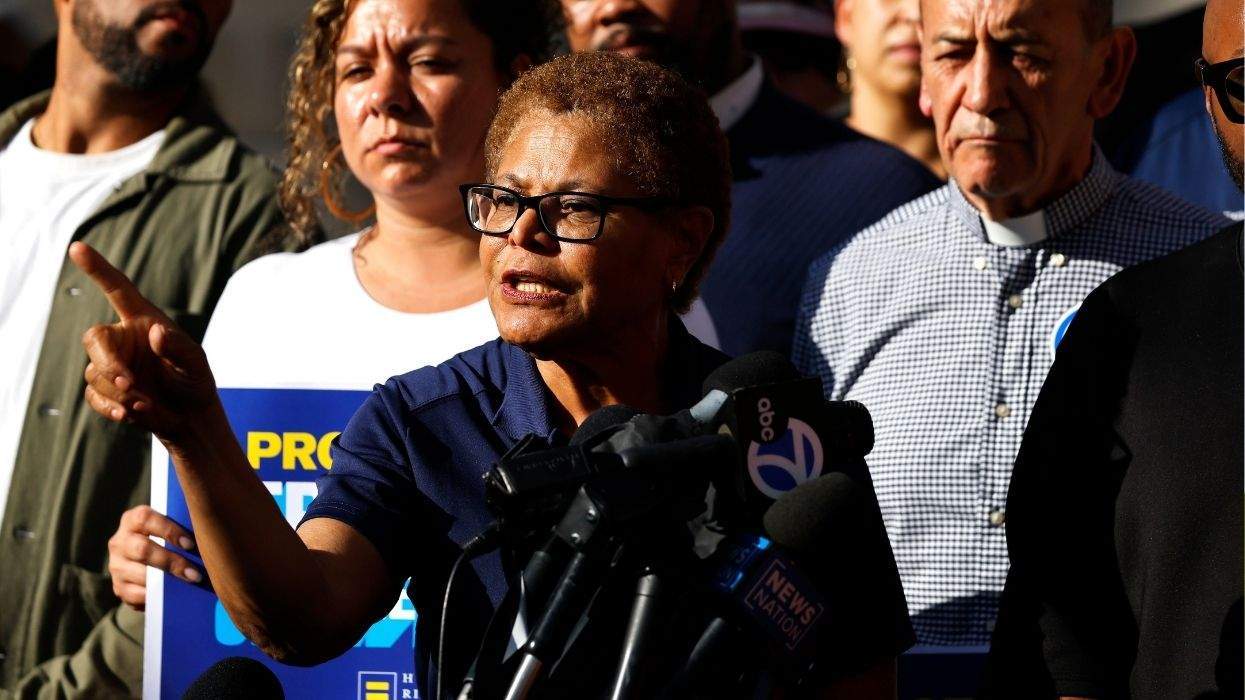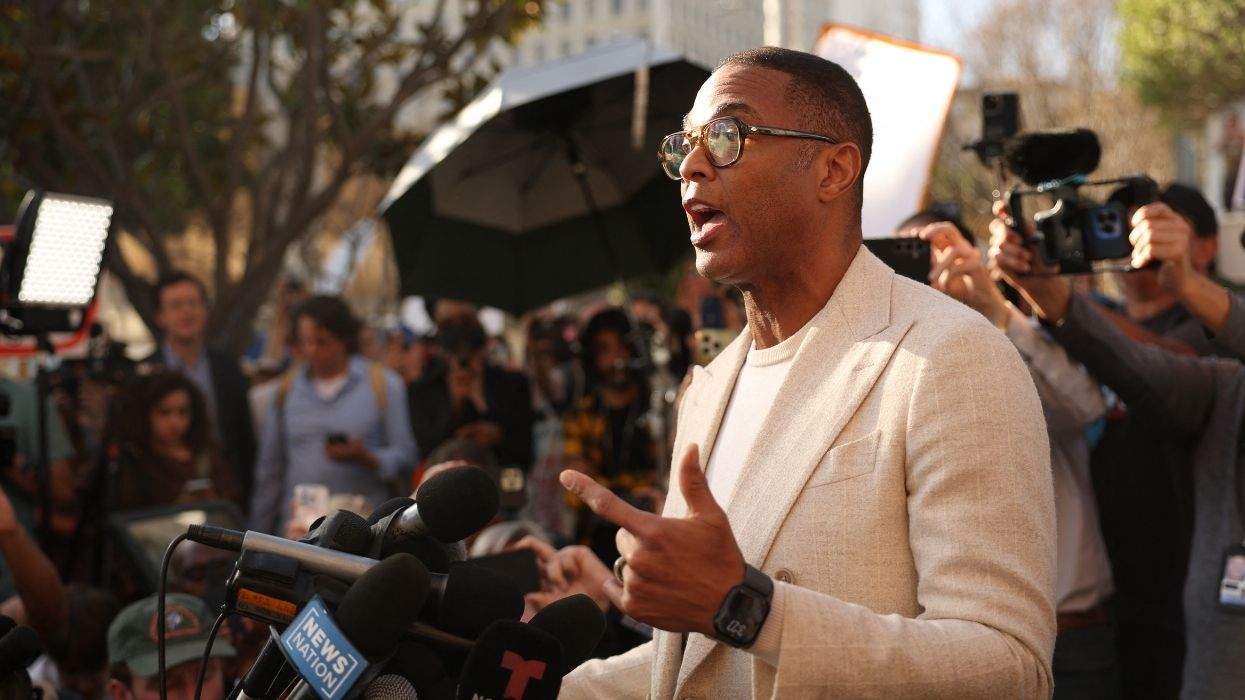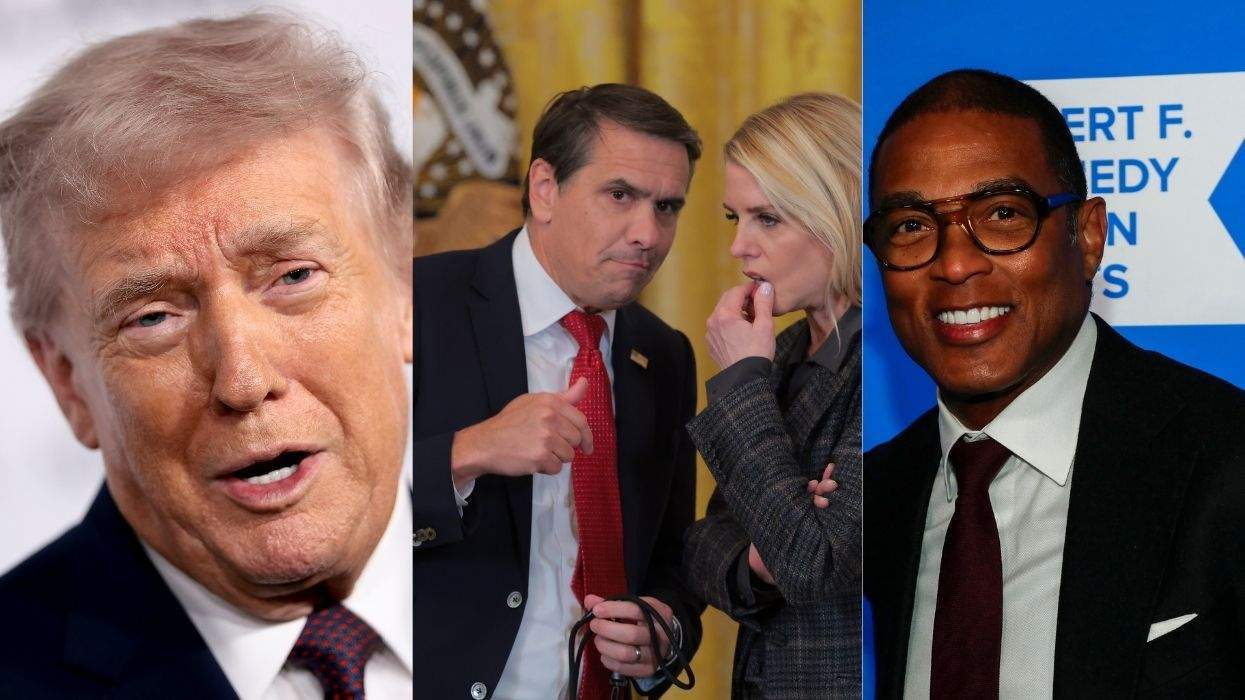A sampling of Facebook advertisements purchased by Russia shows clear intention to undermine Hillary Clinton in the U.S. presidential election in 2016, and probably Western democracy as a whole. But why would Vladimir Putin rally activists to protest homophobes in Kansas? It's one of the more confounding sideshow questions to come from an ongoing investigation into how the striving superpower used social media to meddle in American politics.
A trove of social media posts released Wednesday by the House Permanent Select Committee on Intelligence includes two aimed squarely at LGBT people, including one promoting a counterprotest to a Westboro Baptist Church demonstration in Lawrence, Kan., last year.
"I still can't make the connection why a foreign entity would have any interest in activating LGBT voters against the Westboro Baptist Church, to rally a group of people you already know will be adamantly opposed. I'm just trying to wrap my head around it," said Andre Torkelson, an LGBT-identifying political consultant based in Colorado, who focuses on targeting political messages at voters.
That ad spend for the anti-Westboro ad was inexpensive (just 3,136.68 rubles or about $54) and resulted in about 4,798 ad impressions and 240 ad clicks. That's not terrible for an ad aimed just at voters in Kansas over an 11-day period, but it's hard to say what the objectives of the purchase might have been.
Most of the ads released so far had similarly low spends. Collectively, though, Facebook execs reveal that the more than 3,000 Russian-purchased ads on Facebook and Instagram reached an estimated 10 million people in the United States. For almost all the individual ads, there was less than $1,000 in ad spend, and for half of them, an investment of less than $3 was made.
And the ads weren't carefully targeted, according to Torkelson. While the anti-Westboro ad did home in on Kansas users, it reached out to those aged 14-65+, a group that includes a number of voters too young to vote; more sophisticated marketing efforts could be narrowed with much greater precision to reach active voters of sympathetic demographic groups.
So what goal did Russia ultimately pursue in its buys? Nadine Smith, executive director of Equality Florida, says the ads seen so far show a strategy to "antagonize and sow division."
Another ad specifically targeted toward LGBT voters promoted a coloring book filled with drawings of a cartoonishly muscular Sen. Bernie Sanders, with the cover colored in rainbow patches. The ad targeted LGBT voters and those who voiced support for LGBT causes, specifically those who liked the "LGBT United" Facebook page. That page no longer exists but was among at least 20 apparently created by the Russians as part of the electoral efforts.
That ad appeared with text that certainly seemed to encourage division. "I've recently heard some hateful comments from the Hillary supporters about Bernie Sanders and his supporters, so I really love the idea of this book," the post reads in part.
Smith sees an intentional effort to divide primary voters before the November election. "These ads were likely part of a campaign to peel away LGBT support from Secretary Clinton," Smith said.
Many of the ads released by lawmakers carried extremely anti-Clinton messages, dating back to the primary season, when Clinton battled Sanders for the nomination. Others ratcheted up rhetoric on hot-button topics, directing to pages like "Blacktivist," "Secured Borders," or "Defend the 2nd Amendment." Notably, of the dozens of ads released by the House so far, the only explicitly anti-Trump ad, one tied to the BM Facebook page and promoting a "Stop Trump! Stop Racism!" rally in New York November 12, was purchased a day after the election. That would seem to indicate an ultimate goal of undermining democracy regardless of who won, but definitely doing more to hurt Clinton than Trump.
But Torkelson wonders even about the "sowing division" goal. More likely, the low ad spend was a sign that Russia treated 2016 as a test run in democratic interference, said Torkelson, who previously served as an election watcher in the Ukraine for the Committee for Open Democracy. Putin's interest in electoral disruption, Torkelson says, seemed apparent throughout the Eastern Bloc. And Putin would certainly thumb the scales in favor of pro-Russia candidates if he could. Torkelson figures the Russian president saw greater prospects for manipulating a President Trump than a President Clinton.
Torkelson believes Russia in 2016 mostly wanted to see where money could best be spent on disinformation campaigns, and the spends show Russian officials liked targeting pro-Trump groups more than they liked targeting LGBT voters.
So what about that anti-Westboro rally? It's a mystery to local media as well.
An event announcement for the rally also appeared in an online community calendar for the Lawrence Journal-World, attributed to the group LGBT United Community. Chad Lawhorn, editor of the Kansas newspaper, says the announcement raised no eyebrows at the time. Submitted on the website, it raised no flags for vulgar or offensive content. Nobody questioned if the ad came from a local source or an international one, and even if the newspaper's employees could have traced the email's source then, they cannot now. Lawhorn says Lawrence, a Democratic bastion in a deep red state, actually sees pro-LGBT events in town with regularity, and with Westboro Baptist Church headquartered down the road in Topeka, the community often holds demonstrations and counter-protests.
"We are a community that cares about that [LGBT rights]," Lawhorn says. "It didn't strike us as odd that there would be a counterprotest to the Westboro Baptist Church here."
Lawhorn boasts no insight on the "LGBT United" advertisement. His best guess, based as much on national news coverage as anything, is that Russia's only interest was in inciting civil unrest in the United States by enraging one side of a volatile political issue and getting angry citizens face-to-face with the other side in the public square to maximize the chance of conflict.
Smith notes that fits with other actions Russia took to undermine American democracy. "This is the same cyberattack strategy that had Russia launching a Confederate rally in Texas while also launching the counterprotest," she says. "Russian forces did not create the divisions in American society, but they worked to turn every fracture into a rupture and poured salt in to every open wound."
That may be visible in another Russian ad stoking homophobic sentiment. Connected with the Facebook page "Heart of Texas," the ad calls for the Lone Star State to secede from the union and drills the message home with a photo illustration with an outline of the United States absent Texas, filled in with a photo montage that includes the rainbow flag and Muslim protesters with signs promising "Islam will dominate the world."
So the Russian ads stoke high emotion in a number of camps, almost all through villainizing messaging aimed more at political opponents than by appealing to any sympathetic cause. "Putin is a very smart guy," Torkelson says, "regardless of anything else."
















